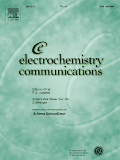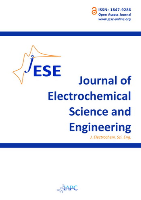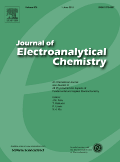
RUSSIAN JOURNAL OF ELECTROCHEMISTRY
Scope & Guideline
Exploring the Frontiers of Electrochemical Science
Introduction
Aims and Scopes
- Electrocatalysis and Electrode Materials:
Research on the development and characterization of new electrocatalysts and electrode materials for applications in fuel cells, batteries, and other electrochemical devices. - Electrochemical Sensors and Biosensors:
Focus on the design and application of electrochemical sensors for detecting various chemical and biological species, including medical diagnostics and environmental monitoring. - Energy Storage and Conversion Technologies:
Studies related to electrochemical energy storage systems such as batteries and supercapacitors, as well as technologies for energy conversion like fuel cells and electrolyzers. - Corrosion Science and Protection:
Investigation of electrochemical mechanisms of corrosion and the development of protective coatings and inhibitors to enhance material durability. - Nanostructured and Composite Materials:
Research into the synthesis and application of nanostructured materials and composite systems that exhibit enhanced electrochemical properties. - Theoretical and Modeling Studies:
Theoretical investigations and numerical modeling that provide insights into electrochemical processes, material behaviors, and reaction mechanisms.
Trending and Emerging
- Advanced Electrocatalysts for Energy Applications:
There is a growing trend towards developing advanced electrocatalysts, particularly those based on novel materials like transition metal compounds and carbon nanostructures, aimed at improving efficiency in hydrogen production and fuel cells. - Integration of Nanotechnology in Electrochemistry:
The incorporation of nanotechnology in the design of electrodes and sensors is a major emerging theme, leading to significant improvements in sensitivity and performance. - Sustainable and Green Chemistry Approaches:
Research focusing on environmentally friendly and sustainable electrochemical processes, including CO2 reduction and waste valorization, is gaining traction. - Smart and Flexible Electrochemical Devices:
The development of flexible and wearable electrochemical sensors and devices is trending, driven by applications in health monitoring and environmental sensing. - Electrochemical Energy Harvesting:
Emerging interest in technologies that harvest energy from ambient sources through electrochemical means, including bioenergy and piezoelectric systems.
Declining or Waning
- Traditional Battery Technologies:
Research on conventional lead-acid and nickel-metal hydride batteries has seen a decrease, possibly due to the growing focus on lithium-ion and next-generation battery technologies. - Basic Electrochemical Theory:
Studies that purely focus on classical electrochemical theory without practical applications are becoming less common, as researchers increasingly seek applied outcomes. - Corrosion Studies in Non-Aqueous Systems:
Research centered on corrosion in non-aqueous environments has diminished, with a shift towards more relevant aqueous systems and electrochemical protection methods. - Low-Temperature Fuel Cells:
Interest in low-temperature fuel cells, particularly those that do not utilize advanced catalysts, appears to be waning as the field moves towards high-efficiency and high-temperature systems.
Similar Journals

Electrochemical Energy Reviews
Pioneering Insights in Energy Engineering and Material ScienceElectrochemical Energy Reviews, published by SpringerNature, serves as an essential platform for the dissemination of cutting-edge research in the fields of electrochemistry, material science, and energy engineering. With an impressive impact factor and ranked in the Q1 category across multiple disciplines including Chemical Engineering and Energy Technology, this journal highlights its commitment to advancing knowledge and innovation within the energy sector. Operating since 2018, the journal not only provides a valuable resource for researchers and professionals but also invites contributions from students and emerging scholars interested in the pivotal role of electrochemical processes in sustainable energy solutions. Published in Germany and widely accessible to the global research community, Electrochemical Energy Reviews is an indispensable reference for those keen on exploring the future of energy technologies.

Electrochemical Science Advances
Pioneering Discoveries in Electrochemical ResearchElectrochemical Science Advances, published by WILEY, is an esteemed Open Access journal that has been making significant contributions to the field of electrochemistry since its inception in 2021. With an ISSN of 2698-5977, this journal serves as a vital platform for researchers and practitioners looking to disseminate their findings on a diverse range of topics within the electrochemical sciences and related areas. The journal has achieved commendable rankings in the Scopus database, placing it in the 2nd quartile in Chemistry (miscellaneous) and the 3rd quartile in Electrochemistry, highlighting its relevance and growing influence in the academic community. As it converges from 2021 to 2024, Electrochemical Science Advances aims to foster collaboration and innovation, offering a vital resource for students, professionals, and researchers dedicated to advancing knowledge and technology in electrochemistry. Access to this cutting-edge research is straightforward, allowing for a comprehensive engagement with the latest advances in the field.

Analytical & Bioanalytical Electrochemistry
Pioneering Research in Electrochemical AnalysisAnalytical & Bioanalytical Electrochemistry is a pivotal journal dedicated to the advancement of research and innovation in the fields of analytical chemistry and electrochemistry. Published by the University of Tehran, Faculty of Chemistry, Center of Excellence in Electrochemistry, this journal has been contributing to the scientific community since its inception in 2009 and continues to be a critical platform through 2024. With an ISSN of 2008-4226, it focuses on a variety of topics including electrochemical sensors, bioanalytical techniques, and innovative methodologies in electrochemical analysis. Although it currently holds a Q4 quartile ranking in both analytical chemistry and electrochemistry categories, its unique insights and research findings are essential for advancing knowledge and fostering interdisciplinary collaboration within the scientific community. Researchers, professionals, and students engaged in these dynamic fields will find valuable resources and contribute to the ongoing discourse by publishing their work in this journal. We invite you to explore and engage with the diverse content that Analytical & Bioanalytical Electrochemistry offers to enhance your research and professional development.

Electrocatalysis
Fostering Interdisciplinary Insights in Electrochemical Science.Electrocatalysis, published by SPRINGER, is a leading journal dedicated to advancing the field of electrochemistry, providing a comprehensive platform for the dissemination of cutting-edge research and innovative methodologies from 2010 to 2024. With an ISSN of 1868-2529 and an E-ISSN of 1868-5994, this journal has established a reputable presence, ranking in the Q3 category of the electrochemistry segment as of 2023 and positioning itself within the 29th out of 60 in the Scopus classification. The journal welcomes submissions that explore a wide array of topics involving electrocatalysts, their applications, mechanisms, and advancements, aiming to catalyze the understanding of electrochemical systems and foster interdisciplinary collaborations. Although the journal is not openly accessible, it remains a vital resource for researchers, professionals, and students seeking to stay abreast of the latest findings and theoretical developments in this dynamic field.

Energy Material Advances
Empowering Innovation in Energy ResearchEnergy Material Advances, published by the American Association for the Advancement of Science, stands at the forefront of energy research, showcasing groundbreaking studies in the realm of renewable energy, fuel technology, and materials science. With the journal's commitment to open access since 2020, it aims to democratize knowledge and foster innovation across a global community of researchers, professionals, and students. The journal boasts an impressive impact factor, placing it firmly within the Q1 category across multiple disciplines including Energy (miscellaneous), Fuel Technology, and Renewable Energy, Sustainability and the Environment, highlighting its significance in advancing scholarly discussions. In the latest Scopus rankings, Energy Material Advances ranks among the top 10% of journals in its field, affirming its role as a pivotal resource for current and emerging trends in energy materials. The journal is dedicated to facilitating collaborative efforts and inspiring novel approaches to the challenges posed by energy sustainability and technological advancement.

ELECTROCHEMISTRY COMMUNICATIONS
Exploring the Frontiers of Electrochemistry with Impactful FindingsELECTROCHEMISTRY COMMUNICATIONS, published by ELSEVIER SCIENCE INC, is a leading journal in the field of electrochemistry, holding a prestigious position in the Q1 quartile since 2023. With an impact factor reflecting its esteemed reputation, the journal ranks #15 out of 60 in the Scopus Chemistry category for Electrochemistry, placing it in the 75th percentile. Since adopting an Open Access model in 2019, it has garnered widespread visibility and accessibility, enabling researchers and professionals to share groundbreaking findings and foster innovation. Covering a wide range of topics from fundamental electrochemical research to practical applications, ELECTROCHEMISTRY COMMUNICATIONS serves as a critical platform for disseminating knowledge and advancing the field. The journal's commitment to quality and relevance positions it as a vital resource for academics and practitioners striving to stay at the forefront of electrochemical science.

Journal of Electrochemical Science and Engineering
Pioneering Knowledge in Electrochemical Technologies.The Journal of Electrochemical Science and Engineering, published by the International Association of Physical Chemists (IAPC), serves as a vital resource for researchers and professionals in the fields of electrochemistry, materials chemistry, and chemical engineering. With an Open Access model since 2011, this journal ensures that groundbreaking research is freely accessible to a global audience, promoting collaboration and knowledge sharing. Situated in Croatia, it showcases cutting-edge developments while focusing on applied aspects related to electrochemical technologies. Notably, the journal holds a commendable Scopus ranking, placing it within the Q3 quartile for multiple categories, including Chemical Engineering (miscellaneous) and Electrochemistry. By fostering innovative research and comprehensive reviews, the Journal of Electrochemical Science and Engineering plays a crucial role in advancing the understanding and application of electrochemical processes, making it an indispensable platform for academics and practitioners alike.

International Journal of Electrochemical Science
Connecting scholars to foster innovation in electrochemistry.International Journal of Electrochemical Science is a peer-reviewed journal dedicated to disseminating cutting-edge research in the field of electrochemistry. Published by Elsevier in Serbia, this journal serves as a vital platform for scientists and researchers to explore innovative electrochemical techniques, processes, and applications. With an ISSN of 1452-3981, it has been a respected source of scholarly articles since its inception in 2006 and continues to bridge the gap between theoretical advancements and practical implementations up until 2024. Notably, it holds a Q4 quartile ranking in the field of electrochemistry and ranks 41 out of 60 in the Scopus database, situating it within the 32nd percentile among its peers. The journal champions open academic discourse, contributing significantly to the advancement of knowledge in electrochemical sciences, making it an essential resource for researchers, professionals, and students alike who are striving towards new discoveries and innovations.

Journal of Electroanalytical Chemistry
Exploring New Horizons in Electroanalytical MethodologiesThe Journal of Electroanalytical Chemistry, published by Elsevier Science SA, stands as a leading platform for the dissemination of cutting-edge research in the field of electroanalytical science. With an impressive impact factor that reflects its esteemed reputation—ranking in the Q1 category for both Analytical Chemistry and Chemical Engineering, alongside a strong presence in Electrochemistry—this journal provides a vital resource for researchers, professionals, and students alike. Covering topics from fundamental electrochemical processes to innovative analytical techniques, the journal aims to foster an in-depth understanding and discussion of contemporary advancements in electroanalytical methodologies. Operating under a model that prioritizes quality and rigor, it facilitates access to high-quality manuscripts and reviews that contribute to the advancement of the field. For over six decades, from 1959 to 2024, it has played an intrinsic role in shaping the landscape of electrochemistry, continually driving forward the frontiers of knowledge and application.

JOURNAL OF THE ELECTROCHEMICAL SOCIETY
Pioneering Research in Materials Science and Renewable EnergyJOURNAL OF THE ELECTROCHEMICAL SOCIETY, published by the ELECTROCHEMICAL SOCIETY INC, is a leading peer-reviewed academic journal dedicated to advancing the field of electrochemistry and its myriad applications. With an ISSN of 0013-4651 and E-ISSN of 1945-7111, this esteemed journal has been a pivotal platform for research since its inception in 1948, with convergence periods allowing for a rich historical context of study through to 2024. Recognized for its high impact, it holds a noteworthy Q1 ranking in several categories including Condensed Matter Physics and Materials Chemistry, and it is Q2 ranked in both Electrochemistry and Renewable Energy. This journal features a range of articles that encompass both theoretical and experimental advancements, making it a crucial resource for researchers, professionals, and students keen on exploring cutting-edge developments in materials science, energy solutions, and sustainable technologies. Although it is not an open access journal, its rigorous standards ensure that published work significantly contributes to the body of knowledge within its fields, fostering innovative research and collaborative progress.